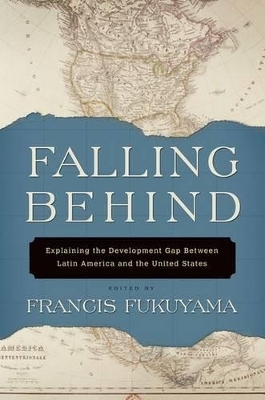
Falling Behind
Oxford University Press Inc (Verlag)
978-0-19-975419-9 (ISBN)
In Falling Behind, Francis Fukuyama gathers together some of the world's leading scholars on the subject to explain the nature of the gap and how it came to be. Tracing the histories of development over the past four hundred years and focusing in particular on the policies of the last fifty years, the contributors conclude that while many factors are important, economic policies and political systems are at the root of the divide. While the gap is deeply rooted in history, there have been times when it closed a bit as a consequence of policies chosen in places ranging from Chile to Argentina. Bringing to light these policy success stories, Fukuyama and the contributors offer a way forward for Latin American nations and improve their prospects for economic growth and stable political development.
Given that so many attribute the gap to either vast cultural differences or the consequences of U.S. economic domination, Falling Behind is sure to stir debate. And, given the pressing importance of the subject in light of economic globalization and the immigration debate, its expansive, in-depth portrait of the hemisphere's development will be a welcome intervention in the conversation.
Francis Fukuyama is Professor of International Political Economy in the School of Advanced International Studies at Johns Hopkins University.
Preface, Enrique Krauze ; 1. Introduction, Francis Fukuyuma ; Part One: The Historical Context ; 2. Two Centuries of South American Reflections on the Development Gap between the United States and Latin America, Tulio Halperin Donghi ; 3. Looking at Them: A Mexican Perspective on the Gap with the United Status, Enrique Krauze ; 4. Explaining Latin America's Lagging Development in the Second Half of the Twentieth Century: Growth Strategies, Inequality, and Economic Crises, Jorge I. Dominguez ; Part Two: The Politics of Underdevelopment in Latin America ; 5. Does Politics Explain the Economic Gap between the United States and Latin America?, Adam Przeworski and Carolina Curvale ; 6. The Role of High Stakes Politics in Latin America's Development Gap, Riordan Roett and Francisco E. Gonzalez ; Part Three: Institutional Factors in Latin America's Development ; 7. Institutions and the Latin American Equilibrium, James A. Robinson ; 8. Do Defective Institutions Explain the Development Gap Between the United States and Latin America?, Francis Fukuyama ; 9. Why Institutions Matter: Fiscal Citizenship in Argentina and the United States, Natalio R. Botana ; Part Four: Conclusions ; 10. Conclusion, Francis Fukuyama
| Erscheint lt. Verlag | 24.11.2011 |
|---|---|
| Verlagsort | New York |
| Sprache | englisch |
| Maße | 171 x 219 mm |
| Gewicht | 467 g |
| Themenwelt | Geisteswissenschaften ► Geschichte ► Regional- / Ländergeschichte |
| Geschichte ► Teilgebiete der Geschichte ► Wirtschaftsgeschichte | |
| Sozialwissenschaften ► Politik / Verwaltung ► Europäische / Internationale Politik | |
| Sozialwissenschaften ► Politik / Verwaltung ► Politische Theorie | |
| Wirtschaft ► Volkswirtschaftslehre ► Wirtschaftspolitik | |
| ISBN-10 | 0-19-975419-5 / 0199754195 |
| ISBN-13 | 978-0-19-975419-9 / 9780199754199 |
| Zustand | Neuware |
| Haben Sie eine Frage zum Produkt? |
aus dem Bereich


